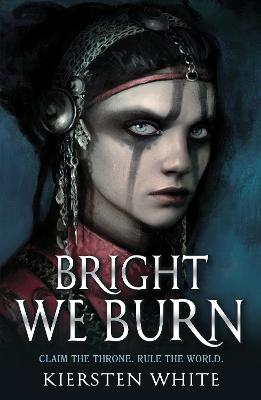Reviewed by Kelly on
Lada Dragwyla
Lada Dragwyla is an unprecedented character in young adult literature, malevolent and ferociously inhumane. Raised as a young woman destined for traditional female servitude, Lada has escaped for the freedom of Wallachia, reestablishing control alongside her trusted Emissaries. Her journey is contravened by inequality, ignorance and chauvinism, her position as Prince inconceivable. Lada has established the admiration of her compatriots and an equitable Wallachia.
Radu Dragwyla
Radu Dragwyla is a spiritual and compassionate young man, sheltered from atrocities and brutality until the conquest of Constantinople by the Ottoman forces. The legitimate heir to the Wallachia throne, Radu circumvented his homeland and responsibilities to advocate for the Mehmed the Conqueror and the Ottoman Empire. Abandoning Lada and the dishevelled, presumably incorrigible, antagonistic relationship. As abandoned children of servitude, Lada and Radu are educated on the Ottoman occupation and prophet Muhammad. Radu embraced the Muslim faith, Lada's determination and defiance captivating Mehmed, the young Ottoman heir.
Mehmed The Conqueror
Mehmed is an aggravating antagonist. As a child heir guided by the Sultan, Mehmed is an idealistic young man possessing grandeur illusions of a region united under Islam. Although Lada and Radu were captivates of the Sultan, Lada establishes a physical relationship with Mehmed creating resentment and hostility in gentle Radu, who is exploring his sexuality. Mehmed often exploits Radu's attraction, therein lies the issue with his character. Appointing Radu as an adviser and attempting to subdue Lada as a compatriot and companion.
Gender Inequality
In Bright We Burn, Lada is tenacious, unrelenting and although aggravated in retaliation, she's accused of genocidal atrocities. Mehmed conquers Constantinople and is applauded and revered for his initiative. As Prince of Wallachia, Lada is held accountable, male counterparts exonerated for the savagery against humanity. Women in positions of domination are inconceivable. Male lineages occupy Europe, women are wives, concubines and adhere to the traditional female roles prevalent throughout the European kingdoms and Lada Dragwyla, a young woman of influence, revolutionising Europe against the Ottoman occupation.
Character Diversity
An amalgamation of religion and sexuality. Muslim, Christian, same sex relationships and Radu's exploration of sexuality and faith. Radu particularly is confronted by the Wallachian Christianity and upon his captivation by the Sultan, embraced Islam by engaging in sessions of prayer and the Holy Month, experiencing the peaceful teaching of Islam throughout Radu's narrative. The gentle relationship between Nazira, her partner Fatima and Radu is exquisite and although society recognises heteronormative relationships, Nazira and Radu share a familial, nonsexual relationship of affection and tenderness.
Historically, Mehmed the Conqueror was rumoured to have been sexually attracted to men which is unclear throughout The Conquerors Saga. Mehmed shares intimate moments with Radu, gentle gesturing, alluding to the rumours that his harem as Sultan contains consenting men for the Sultan's sexual gratification. To disperse rumours, Mehmed ostracises Radu to Constantinople, unclear if Mehmed is sexually attracted to Radu or exploiting the young Dragwyla's affections.
Essential Reading
The Conquerors Saga is a brutal alternative history of the Prince of Wallachia, blending historical fiction with a cruel and calculating antihero that pushes gender roles, stereotypes and labels. A breathtaking, historical alternative of the Ottoman Empire during fifteenth century Europe and an impeccable finale to what is an outstanding young adult series.
Reading updates
- Started reading
- 12 August, 2018: Finished reading
- 12 August, 2018: Reviewed
